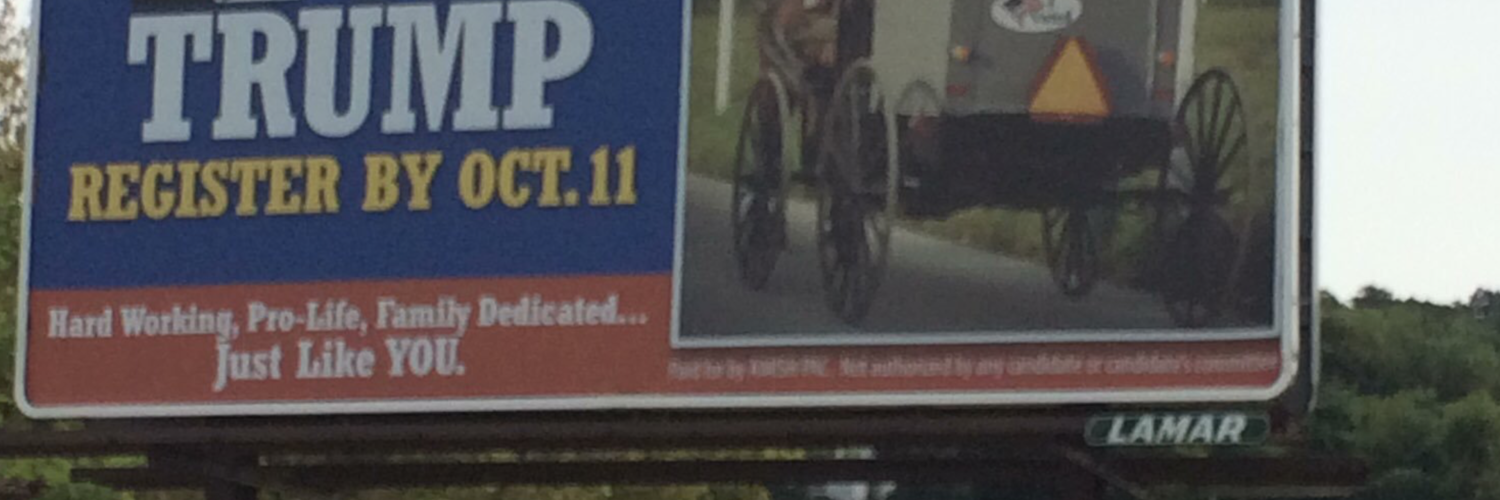
Julie Zauzmer seems to be the Washington Post’s down-in-the-trenches reporter these days who gets to slog about places like rural West Virginia, Concord, N.H. and Virginia Beach to get interesting stories outside the Beltway.
Must say I appreciate it when journalists get off the phone and go on the road. Her latest is based out of Lancaster County, Pa., where there’s an effort going to get the reclusive Amish to sign up to vote for President Donald Trump in 2020.
There’s only one problem. Amish folks aren’t hot on being interviewed. Read the beginning of the piece:
MANHEIM, Pa. — In 2016, when more than 6 million Pennsylvanians voted in the presidential election, the state’s 20 pivotal electoral votes were decided by a margin of less than 45,000 voters.
Pennsylvania is home to more than 75,000 Amish people, and most who are eligible don’t vote.
For two Republican operatives, those two numbers add up to one major opportunity — to convince the traditionally reluctant Amish to come out to the polls, where their votes might be tremendously influential…
What they came up with was a group called the Amish PAC, which hopes to keep Pennsylvania — always a vital swing state — Republican in 2020.
Amish people tend to align strongly on policy with Republicans, who share their opposition to abortion and same-sex marriage. But making voters out of the Amish, who forgo television and the Internet and believe fiercely in the separation of their religious community from government intrusion, may be a steep goal.
No kidding.
On a farm where eight Amish children in their traditional clothing were playing baseball, a young woman said sternly of those who would ask the Amish to vote: “We don’t really appreciate that.”
As she skillfully snapped lima bean pods off the bushes at her farm, another woman said about voting: “My husband never did; I never did.”
The same answer at market stall after market stall, where Amish farmers sell their wares: Never voted. Never wanted to vote.
Except for some remarks at the very end, that’s the extent of the quotes Zauzmer manage to coax out of these folks.
So she turned to the local Mennonites, who have similar beliefs to the Amish, but aren’t as camera shy. It sounds like she had to tromp about some farms to seek them out.
Yvonne Beiler, a Mennonite farm owner, said she had heard about the voter-registration push, and she wasn’t interested. “We don’t vote, and we just try to pray for our leaders,” she said as her cows mooed loudly and one of her six children called out to her as he tinkered with a wrench…
“I guess we just feel like it’s not for us to vote. That would be our belief, I guess,” Beiler said. “I’m not exactly sure. We just don’t do that.”
In doing so, she found out that the locals were impressed with George W. Bush when he ran for president, but haven’t been very taken with any candidate since.
Bush and his father, George H.W. Bush, were the only two sitting presidents who came to speak to Amish people, Nolt says. The younger Bush already had goodwill built up by his father in the community, and he campaigned hard in Pennsylvania. His frequent talk of Christian values, his identification with rural America and his opposition to abortion and same-sex marriage all appealed to the Amish.
So how is the founder of this PAC selling Trump?
His fundraising messages, which drum up donations from Republicans across the country willing to invest in the Amish vote, mock Democrats and use favorite Fox News catchphrases. When he talks to Amish would-be voters, he takes a different tone. “The Amish care about religious liberty, business regulation, abortion and judges. Those are four things that the Amish overwhelmingly support President Trump over whoever the Democratic candidate is.
One does wonder if the PAC tells about some of the downsides of Trump: His constant lying, the casinos, the multiple marriages, the profanity and the list goes on. But Trump has included religion in his brand in recent years and that’s what this PAC is going to concentrate on.
Others, by the way, have written about the Amish vote before, such as this 2016 article from Vice, which nicely goes into some of the theology of why the Amish don’t think voting matters much this side of heaven. The reporter also interviewed Donald Kraybill, a leading expert on the Amish at Pennsylvania’s Elizabethtown College and the go-to person for most media. I’m curious why Zauzmer interviewed two other professors from the same college and not him.
Anyway, I much appreciate how tough it is to interview these folks. Unless it’s market day or church, most Amish stick to their farms — meaning the reporter has to venture out on private property to find them.
Years ago, I visited a contact who lived in Amish country and knew them well. I brought some Kurdish friends with me, so they could see a part of American culture they’d never otherwise view. All of us got to visit Amish families in their homes and of course I peered about, trying to figure out how they kept their homes lit without electricity.
So I can’t imagine how much harder it must have been to basically do cold calls at Amish farms and stalls at the local market to get anyone to talk. I’d sure be interested in how other communities among America’s 300,000 Amish are dealing with this. I know there’s a bunch of them scattered about the country. Here’s hoping other reporters seek out the local “plain people” in their communities.










